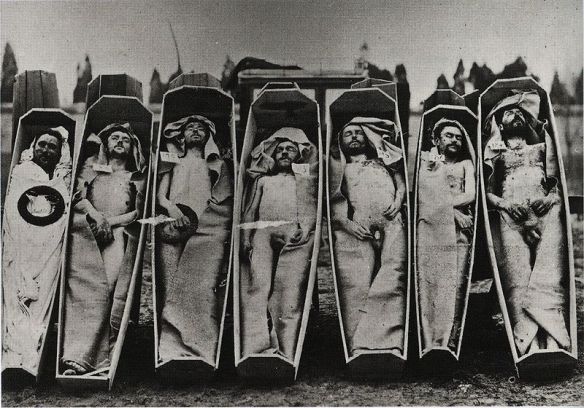
Karl Marx’s alternative to capitalism part 49
Arguments based on Marx’s 1859 Preface are often considered to be ‘reductionist’ or ‘determinist’, robbing the oppressed of their agency.1 Productive forces are reduced to technology which drives accumulation, while in reality the order is the reverse – it is accumulation that drives technology and this accumulation is the growth of capital, of relations of production that involve the existence primarily of two classes which are involved in struggle.
People inhabit the forces of production and drive it forward and people inhabit the relations of production and perform the roles appropriate to the classes that are included in them.
The forces and relations of production therefore provide the grounds on which such agency makes sense and can be accounted for. Of course, they also involve constraints on such agency, but if they didn’t, they wouldn’t provide any sort of explanation at all.
This approach can be contrasted with real determinist arguments based on the idea of the inevitable breakdown of capitalism, which subject it has been said ‘is one which has plagued students of Marx for at least a century . . . veritable rivers of ink have been spent in an effort to fill up this gap in Marx’s theoretical system.” (Martin Nicolaus, The Unknown Marx, New Left Review 1/47 March – April 1968. P55)
Marx does not hold a breakdown theory of capitalism but since as long as capitalism exists it will continue to develop through its contradictions, these contradictions must develop to certain limits.
First, he notes in Capital Volume III, that:
`As soon as formation of capital were to fall into the hands of a few established big capitals, for which the mass of profit compensates for the falling rate of profit, the vital flame of production would be altogether extinguished. It would die out.’
Elsewhere, in the Grundrisse:
‘To the degree that large-scale industry develops, the creation of real wealth comes to depend less on labour-time and on the quantity of labour expended, and more on the power of the instruments which are set in motion during labour-time, and whose powerful effectiveness itself is not related to the labour-time immediately expended in their production, but depends rather on the general state of science and the progress of technology…. ‘
‘As soon as labour in its direct form has ceased to be the great wellspring of wealth, labour- time ceases and must cease to be its measure, and therefore exchange-value the measure of use-value. . . . With that, the system of production based on exchange-value collapses. . . . Capital is its own contradiction- in-process, for its urge is to reduce labour-time to a minimum, while at the same time it maintains that labour-time is the only measure and source of wealth.’
‘Productive forces and social relations—both of which are different sides of the development of the social individual—appear to capital only as means, and only means to produce on its limited basis. In fact, however, these are the material conditions to blow this basis sky-high.’ (Marx, Grundrisse pp 592–94, quoted in Nicolaus pp 58–59)
Marx did not expect capitalism to last long enough to get to this stage of its development and anticipated the contradiction between ‘productive forces and social relations’ to precipitate its replacement long before it. The continued expansion of capitalism and growth of what is conventionally called service industries means that neither lack of competition or an approach to the limit of labour in production has resulted in either of these limits being nearly approached.
In 1850, shortly after the failed revolutions of 1848, Marx wrote:
‘While this general prosperity lasts, enabling the productive forces of bourgeois society to develop to the full extent possible within the bourgeois system, there can be no question of a real revolution. Such a revolution is only possible when two factors come into conflict: the modern productive forces and bourgeois forms of production . . . A new revolution is only possible as a result of a new crisis; but it will come, just as surely as the crisis itself.’ (The Class Struggles in France: 1848 to 1850’)
These have not been the constraints that successive generations of Marxists have thought placed unwanted boundaries on their objectives. Instead, the contradiction between the forces and relations of production is viewed as objective conditions already being in place with only purely subjective ones required to come into line through the effects of capitalist crises. These objective crises express the fetters on the development of the forces of production and the social relations in which they are encased and are assumed to rapidly advance the subjective requirements for revolution.
For Marx however, economic crises are ‘always but momentary and forcible solutions of the existing contradictions. They are violent eruptions which for a time restore the disturbed equilibrium.’ (Capital Vol III). They are therefore not only ‘the most striking form in which advice is given it to be gone and to give room to a higher state of social production’, but their ‘violent destruction of capital’ is ‘a condition of its self-preservation.’ (Grundrisse)
Far from signalling stagnation of the forces of production, these forces are most developed just as crises erupt. And as we have noted before, concomitant with the growth of the forces of production is expansion of the relations of production: of the capitalist and working classes, upon which is dependent the struggle for socialism.
Socialism thus becomes more relevant and feasible as crises worsen but not because they get worse but because of what this says for the development of the forces of production. There is no final crisis and therefore no final breakdown we can look towards as a resolution to capitalism and advent of socialism; even if nothing lasts forever. Crises allow capitalism to seek an equilibrium, while also demonstrating its historical redundancy and potential for replacement, but neither is automatic, and while the former has occurred often, the latter has unfortunately not.
Crises may therefore be the occasion for political revolution – conquest of state power by the working class – through stimulation, but the success of political revolution does not fundamentally depend on them or on their severity. The objective conditions for this we have explained and there is no neat dividing line between these and the subjective conditions constituted out of the class struggle and the capacity, readiness and willingness of the working class to defend and advance its interests through political revolution.
The lack of correspondence between the two has not only involved ripeness of objective conditions and backwardness of the subjective, but also the development of some important subjective conditions in advance of objective constraints on successful revolution.
- ‘Only once in his life did he speak with a tone of achievement and a sense of accomplishment about one of his works. Only once did he announce that he had written something which not only encompassed the whole of his views, but also presented them in a scientific manner. That occasion was in the Preface to the Critique of Political Economy.’ (1859). Martin Nicolaus, The Unknown Marx, New Left Review 1/47 March – April 1968 p42.
Back to part 48
Forward to part 50

 Certain aspects of the debate between Mandel and Warren obviously reflect the period in which it occurred, particularly post-war social democracy, Keynesianism and the accepted role of the state in economic policy. Some of this would appear to have been misunderstood as simply due to the power of the working class in defining the priorities of society; as opposed to the socialisation of capital and production noted by Marx as a developmental law of capitalism, with an increased role for the capitalist state in this process. In this development the priorities being asserted were primarily those of capital and capitalism.
Certain aspects of the debate between Mandel and Warren obviously reflect the period in which it occurred, particularly post-war social democracy, Keynesianism and the accepted role of the state in economic policy. Some of this would appear to have been misunderstood as simply due to the power of the working class in defining the priorities of society; as opposed to the socialisation of capital and production noted by Marx as a developmental law of capitalism, with an increased role for the capitalist state in this process. In this development the priorities being asserted were primarily those of capital and capitalism.
 In 1969 the Belgian Marxist Ernest Mandel wrote
In 1969 the Belgian Marxist Ernest Mandel wrote  When we consider the role of capitalist economic crises in the creation of a new society we are not short of guidance. Capitalism has had so many crises that there have been innumerable opportunities to investigate just how such crises prompt or accelerate the socialist alternative. In Ireland, the economic crash of 2008 destroyed the credibility of the main capitalist Party, Fianna Fail, whose Finance minister had hailed “the cheapest bail-out in the world” before it bankrupted the state and brought in the IMF, European Central Bank and European Commission to determine the state’s response to the crisis.
When we consider the role of capitalist economic crises in the creation of a new society we are not short of guidance. Capitalism has had so many crises that there have been innumerable opportunities to investigate just how such crises prompt or accelerate the socialist alternative. In Ireland, the economic crash of 2008 destroyed the credibility of the main capitalist Party, Fianna Fail, whose Finance minister had hailed “the cheapest bail-out in the world” before it bankrupted the state and brought in the IMF, European Central Bank and European Commission to determine the state’s response to the crisis.
 In 1921 Leon Trotsky argued that “If the further development of productive forces was conceivable within the framework of bourgeois society, then revolution would generally be impossible. But since the further development of the productive forces within the framework of bourgeois society is inconceivable, the basic premise for the revolution is given.”
In 1921 Leon Trotsky argued that “If the further development of productive forces was conceivable within the framework of bourgeois society, then revolution would generally be impossible. But since the further development of the productive forces within the framework of bourgeois society is inconceivable, the basic premise for the revolution is given.”
 Capitalism’s crises are the expression of its contradictions, among which must be those that provide grounds for resolution through working class creation of a socialist society. While the absence of crisis at any time does not mean that the system’s contradictions have been removed, it signals that they must at least have been temporarily contained or limited while continuing to develop, without erupting into violent disruptions of the system. Marx reacted to the return to some sort of prosperity following a crisis as a signal that socialist revolution was for the time being off the agenda.
Capitalism’s crises are the expression of its contradictions, among which must be those that provide grounds for resolution through working class creation of a socialist society. While the absence of crisis at any time does not mean that the system’s contradictions have been removed, it signals that they must at least have been temporarily contained or limited while continuing to develop, without erupting into violent disruptions of the system. Marx reacted to the return to some sort of prosperity following a crisis as a signal that socialist revolution was for the time being off the agenda.


 Last year an
Last year an  The significance of this is even more noteworthy because this segment of the US working class was part of the embodiment in the middle of the twentieth century of the American dream and therefore of the capitalist vision epitomised during the American century. Visions of white families in suburbs, owning automobiles and domestic appliances, in new homes with pretty gardens and white picket fences were a domestic ambition so strong it fired the imagination not only of American workers but millions of the poor across the world who wished to become American. An ambition millions succeeded in achieving.
The significance of this is even more noteworthy because this segment of the US working class was part of the embodiment in the middle of the twentieth century of the American dream and therefore of the capitalist vision epitomised during the American century. Visions of white families in suburbs, owning automobiles and domestic appliances, in new homes with pretty gardens and white picket fences were a domestic ambition so strong it fired the imagination not only of American workers but millions of the poor across the world who wished to become American. An ambition millions succeeded in achieving.

